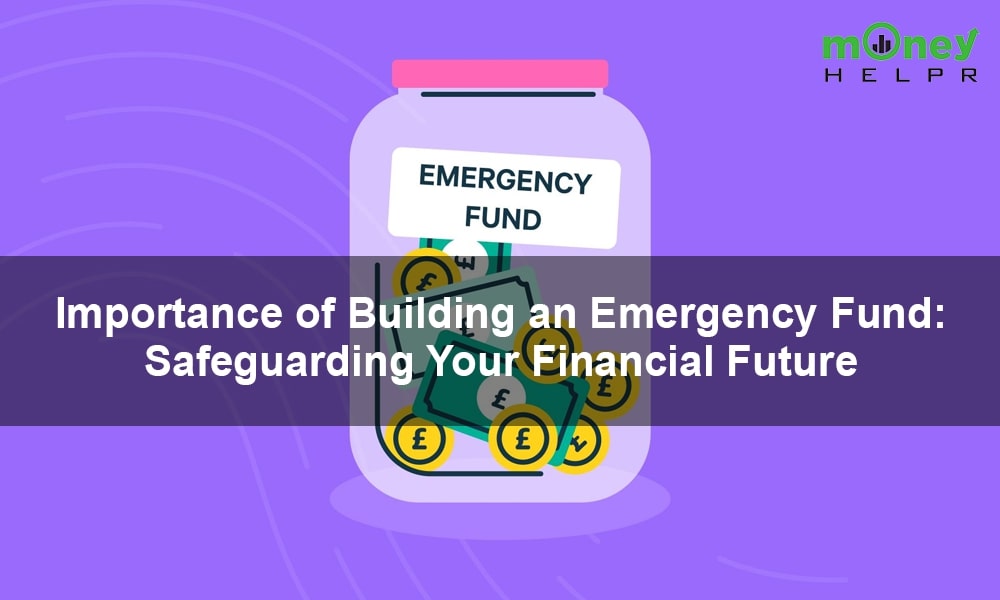In today’s unpredictable world, unexpected financial setbacks can happen to anyone at any time. Whether it’s a sudden job loss, a medical emergency, or a major home repair, these unforeseen expenses can wreak havoc on your finances. That’s why building an emergency fund is crucial. In this blog post, we will explore the importance of an emergency fund, its benefits, and practical steps to start and grow your own emergency fund.
What is an emergency fund?
Before delving into the significance of building an emergency fund, let’s define what it is. An emergency fund is a dedicated savings account specifically earmarked for unforeseen expenses. It acts as a financial safety net, providing a cushion to fall back on during challenging times. The primary purpose of an emergency fund is to cover essential expenses when faced with unexpected circumstances.
Benefits of having an emergency fund
An emergency fund offers several benefits contributing to your financial well-being and peace of mind. Here are a few major advantages to maintaining an emergency fund:
Financial Security and Stability:
An emergency fund acts as a safety net, providing security and stability in times of unexpected financial challenges. It ensures that you have funds readily available to cover essential expenses, such as medical bills, car repairs, or temporary loss of income due to a job loss.
Stress Reduction:
Financial emergencies often come with emotional stress and anxiety. Having an emergency fund can significantly reduce the stress associated with unexpected expenses. Knowing you have funds for emergencies allows you to face unforeseen circumstances with greater confidence and peace of mind.
Avoiding Debt and Breaking the Cycle:
People often borrow money or use credit cards to address sudden expenses without an emergency fund. This can lead to accumulating debt and getting trapped in a cycle of financial dependency. An emergency fund helps you avoid debt and preserve your financial independence.
Freedom to Make Sound Decisions:
With an emergency fund, you can make sound financial decisions without feeling rushed or pressured. It allows you to handle emergencies without making hasty choices that could have long-term negative consequences, such as taking on high-interest loans or withdrawing from retirement savings.
Protection Against Income Loss:
If you experience a sudden loss of income, whether due to a job loss or an unexpected event, an emergency fund can help bridge the gap until you find alternative sources of income. It provides a financial cushion that allows you to maintain your lifestyle and meet your financial obligations during the transitional period.
Exploiting Opportunities:
An emergency fund protects you from unexpected expenses and presents opportunities for financial growth. It enables you to seize favorable opportunities that may arise, such as investing in a promising venture or taking advantage of discounted investments during market downturns. Having readily available funds allows you to capitalize on these opportunities without compromising your financial stability.
Building and maintaining an emergency fund offers invaluable financial security, stress reduction, and the freedom to navigate unexpected circumstances without incurring debt. It empowers you to confidently handle emergencies while preserving your long-term financial goals and aspirations.
The Significance of Building an Emergency Fund
Financial Security and Stability
Having an emergency fund ensures you have a financial safety net to rely on when emergencies arise. It offers a sense of security and peace of mind, knowing you are prepared to handle unexpected expenses without incurring debt or sacrificing your financial stability.
Stress Reduction
Financial emergencies often come with emotional stress. Having an emergency fund in place can alleviate some of the anxiety and worry that accompany unexpected financial burdens. Knowing you have funds readily available to tackle emergencies allows you to focus on finding solutions rather than worrying about covering expenses.
Avoiding Debt and Breaking the Cycle
Without an emergency fund, people often borrow money, rely on credit cards, or take out loans to address sudden expenses. This can lead to a cycle of debt and financial dependency. By having an emergency fund, you can avoid falling into debt traps and maintain your financial independence.
Seizing Opportunities
An emergency fund protects you from unexpected expenses and opens doors for seizing opportunities. It provides the flexibility to take advantage of favorable circumstances, such as career advancements, business ventures, or investment opportunities. Having readily available funds allows you to capitalize on these situations without disrupting your financial stability.
How to Build an Emergency Fund?
Set clear savings goals
Start by setting realistic savings goals for your emergency fund. Assess your current financial situation, including your monthly income, expenses, and financial obligations. Determine how much you need to cover at least three to six months’ essential expenses.
Prioritize Saving
Make saving a priority in your budget. Allocate a portion of your income specifically for your emergency fund. Treat it as a non-negotiable expense and consistently contribute to it.
Automate Savings
Take advantage of automation tools offered by banks or financial apps. Set up an automatic transfer from your checking account to your emergency fund savings account regularly. This ensures that you save consistently without relying on willpower alone.
Cut expenses and increase income
Review your expenses and identify areas where you can cut back. Consider adopting frugal habits and eliminating unnecessary spending. Additionally, explore ways to increase your income, such as taking on a side gig or freelancing.
Start Small and Be Consistent
If you’re just starting, don’t be discouraged by the initial amount. Every small contribution adds up over time. Focus on building the habit of consistent saving and gradually increasing the amount as your financial situation improves.
Diversify Your Emergency Fund
Consider diversifying your emergency fund by holding it in different types of accounts or assets. Instead of solely relying on a traditional savings account, explore options like high-yield savings accounts, money market accounts, or even low-risk investments. Diversification can increase the growth of your emergency fund over time.
Regularly review and replenish your fund
Your financial situation may change over time, so reviewing your emergency fund and adjusting it regularly is important. Life events such as a salary increase, changes in expenses, or major life milestones can impact the adequacy of your emergency fund. Conduct periodic evaluations and replenish the fund as needed to ensure it aligns with your current circumstances.
Educate Yourself on Financial Management
Building an emergency fund is just one aspect of effective financial management. Take the opportunity to educate yourself on broader financial topics such as budgeting, investing, and debt management. By improving your financial literacy, you’ll be better equipped to make informed decisions, grow your wealth, and protect your emergency fund in the long run.
By incorporating these additional points into the blog, readers will gain a more comprehensive understanding of the importance of building an emergency fund and how to optimize its effectiveness.
Conclusion
Building an emergency fund is a vital step toward financial security and stability. It empowers you to confidently navigate unexpected financial challenges without resorting to debt or jeopardizing your long-term financial goals. By setting clear savings goals, making saving a priority, and being consistent in your efforts, you can gradually build an emergency fund that provides you with a safety net during difficult times. Remember, it’s never too late to start. Start today, take control of your finances, and build a brighter and more secure financial future for yourself and your loved ones.
In conclusion, prioritize building an emergency fund and safeguarding your financial future. By doing so, you will be better prepared to weather the storms that life may throw at you and achieve long-term financial well-being.

